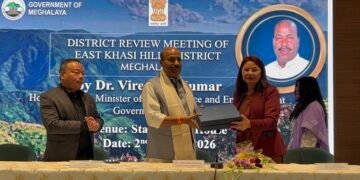The Ministry of Home Affairs (MHA) has not given any assurance whether the Khasi and Garo languages will be included in the Eighth Schedule of the Constitution.
In a reply to the demand made by the Hynñiewtrep Achik National Movement (HANM) for inclusion of the state’s languages, MHA deputy secretary P Venukuttan Nair informed that there are 22 languages included in the Eighth Schedule and demands are there for inclusion of more languages, including Khasi and Garo languages.
Nair also pointed out that it is difficult for the ministry to fix criteria for languages. “As the evolution of dialects and languages is a dynamic process, influenced by socio cultural, economic, and political developments, it is difficult to fix any criterion for languages, whether to distinguish them from dialects, or for inclusion in the Eighth Schedule to the Constitution,” he said.
The ministry further stated that the earlier attempts, through the Pahwa (1996) and Sitakant Mohapatra (2003) committees, to evolve such fixed criteria have remained inconclusive.
“The Government of India is conscious of the sentiments and requirements for inclusion of other languages in the Eighth Schedule and that such requests have to be considered keeping in view these sentiments and other relevant considerations,” the ministry said.
Last month, HANM led a delegation and protested at Jantar Mantar in New Delhi and also submitted memorandums on issues like the implementation of the Bengal Eastern Frontier Regulation, 1873 (ILP), and constitution of the boundary commission to resolve the boundary dispute between Meghalaya and Assam.
On the constitution of the boundary commission to resolve the boundary dispute between Meghalaya and Assam, the MHA in its response to HANM said it is under the purview of the Central State division, for which the petition is being forwarded.
HANM president Lamphrang Kharbani said there was no clear response from the ministry on implementation of the ILP. He, however, said that the organisation has constituted the ‘anti-influx operation cell’ until the ILP is implemented in the state.

























